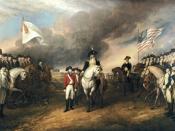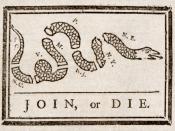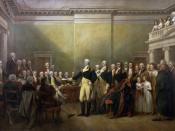The American Revolution was mainly due to economics, which the British limited, the trading of American Colonies. After the French-Indian War, Great Britain was in debt. In order to restore Britain's finances, the British Government imposed number taxes in its colonies; a prominent amongst them was the Stamp act. Because the American Colonies were only permitted to trade with Britain, it however limited the wealth and prosperity of the American Colonies and its people. This eventually led to massive protests against Britain in the colonies. In 1774 when matters went from bad to worse, the Intolerable Act laws were passed in Britain, as a punishment for the Boston Tea Party. This however, limited production of raw materials and economic growth. This led to protests in the colonies, which led the British military to go to the colonies and maintain civil authority. But on April 19, 1775, the British troops were giver orders to investigate if the colonists were "stockpiling weapons in concord."
This however led to the Battle of Lexington, while initiating the American Revolution. Despite losing major battles to the British, the rebels won the war, due to military and political, as well as foreign aid. However they suffered economically through out the war.
One of the military factors which were significant in the Revolution was leadership. One of the key figures in the war for independence, who fought for the rebel's cause, was George Washington; who contributed to the major role of leadership, as commander in chief, for the rebels. George Washington was a significant key figure in the American Revolution, with a great reputation as well. He had served in the House of Burgesses (1759-1775), as well as the Continental Congress (1774-1775).He also had served in the French-Indian War. Although his political and military...


